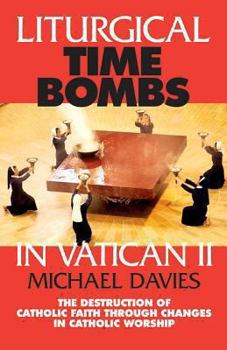Liturgical Time Bombs in Vatican II: Destruction of the Faith Through Changes in Catholic Worship
Select Format
Select Condition 
Book Overview
Michael Davies shows how Fr. Annibale Bugnini--before his dismissal by Pope Paul VI under suspicion of being a Freemason--was able to "reform" the Catholic Mass into the constantly evolving liturgy.... This description may be from another edition of this product.
Format:Paperback
Language:English
ISBN:0895557738
ISBN13:9780895557735
Release Date:January 2009
Publisher:Tan Books
Length:128 Pages
Weight:0.45 lbs.
Dimensions:0.3" x 5.5" x 8.3"
Customer Reviews
3 ratings
Sad but True
Published by Thriftbooks.com User , 16 years ago
Mr. Davies tells the tale of the dismantling of the Traditional Latin Mass with clarity and vigor. He cites his sources and gives ample evidence of his opinions. Interestingly, another reviewer who panned Mr. Davies' book cited Father Reid as a more reliable source, the same Father Reid who endorses Mr. Davies! Let me add my own meager endorsement to Father Reid's whose scholarship includes not only the books noted by the reviewer below, but also the excellent updating of Fortescue and O'Connell's, Ceremonies of the Roman Rite Described.
Davies pulls no punches
Published by Thriftbooks.com User , 16 years ago
The liturgical reform of the Second Vatican Council is very much a live issue. Michael Davies, for whom this issue was a cause, is a straight-shooter. His numerous works on the liturgical reform that followed it are relentless in their exposition of the nature and causes dissolution that the Roman rite experienced since 1964. This book is timely for the "question" of the Liturgy is very much under consideration at the present. The fundamental message of the book is contained in its title: the Conciliar Constitution on the Sacred Liturgy contained elements that would later explode and wreak havoc; or, in the words of Aidan Nichols, it "carried within it, encased in the innocuous language of pastoral welfare, some seeds of its own destruction." In demonstrating how such a grave state of affairs could come to be, Davies looks briefly at the twentieth century Liturgical Movement. Rightly, Davies states that the it sought "liturgical renewal within the Roman rite, but a renewal within the correct sense of the term, using the existing Liturgy to its fullest potential." And Davies correctly asserts that the ground for erroneous liturgical reform was laid by the didacticism of some later Movement enthusiasts, and by the consequent reformism which they espoused, which had far too much in common with the Enlightenment liturgical reforms condemned by Pius VI in 1794 and deprecated by Pius XII in 1947 in Mediator Dei. Archbishop Bugnini looms large early in the ascendancy of the reformists. Davies clashed personally with Bugnini over the question of the prelate's alleged masonic affiliation, and here Davies' presents clear arguments in support of his claim. I have to confess to always having wondered whether the question of who was or was not a mason amongst the curia is not a distraction from the critical assessment of the liturgical reforms? Surely the reforms themselves are what must be judged, not the moral probity of their advocates? But Davies is right to point the finger at Bugnini, for he pushed for ritual reforms that served his view that a didactic and radically simplified Liturgy was what modern man required well before the Second Vatican Council. And, given Bugnini's appointment as Secretary to the Council's Preparatory Commission, there is no doubt that he was ideally placed to see to the preference of his ideas. However, as Davies makes clear, Bugnini was not named Secretary of the Liturgical Commission during the Council itself, and was sacked from his Roman teaching post at the same time. Under the new Pope Paul VI, however, he was named Secretary of the post-conciliar Consilium and resumed his `interrupted' work. It is important to note that the Fathers of the Council did not draft the schema on the Sacred Liturgy which they were called upon to debate; this was done under Bugnini's co-ordination, who for more than a decade prior to the Council had been pushing for a reform along the lines of questionable principles. Thus, Davies asser
one of the most heartbreaking books i've ever read
Published by Thriftbooks.com User , 17 years ago
If you are interested in how Vatican II came about and how things went to far from what the church fathers seemingly intended you owe it to yourself to sit down and read this book. Michael Davies was a terrific writer and a careful one. He has credible sources and is very calm in his approach to the book.





